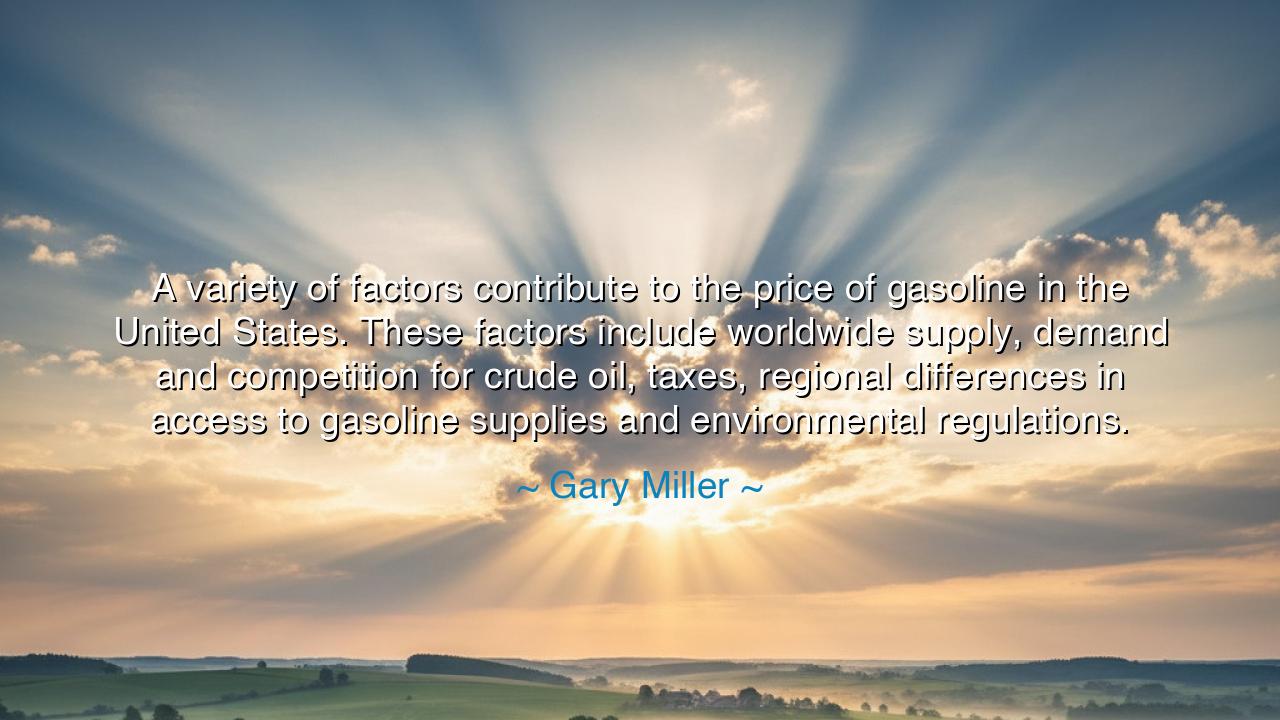
A variety of factors contribute to the price of gasoline in the
A variety of factors contribute to the price of gasoline in the United States. These factors include worldwide supply, demand and competition for crude oil, taxes, regional differences in access to gasoline supplies and environmental regulations.






The words of Gary Miller, “A variety of factors contribute to the price of gasoline in the United States. These factors include worldwide supply, demand and competition for crude oil, taxes, regional differences in access to gasoline supplies and environmental regulations,” are not the cold utterances of mere economics, but the unveiling of a truth that touches the daily lives of millions. In this statement, he reminds us that what we pay at the pump is not shaped by a single hand, but by a vast and tangled web of forces—global and local, natural and political, human and environmental. His words are a warning against simplicity, for in the price of gasoline lies a reflection of the world’s complexity itself.
The origin of this saying rests in Miller’s role as an American lawmaker, who often dealt with the concerns of energy policy and the economy. Citizens asked why the price of gasoline rose or fell, often seeking blame in a single culprit—greed, foreign nations, or government policies. Yet Miller explained that the truth was far broader: it was the interplay of supply and demand, the shifting tides of international markets, the weight of taxes, the burden of regulations, and the unique challenges of geography and infrastructure. In this way, his words are both explanation and caution, urging the people to see beyond the surface into the deeper mechanics of power, trade, and nature.
History itself offers a stark mirror in the crisis of the 1973 Oil Embargo. When oil-producing nations in the Middle East restricted supply, gasoline prices in the United States skyrocketed. Long lines formed at gas stations, tempers flared, and the nation felt its vulnerability. This crisis showed clearly what Miller later described: that worldwide supply and demand could shake even the strongest economies. It was not a failure of one nation alone, but the interdependence of many. The lesson was that energy prices are born not in isolation, but in the global marketplace of resources and rivalries.
The deeper meaning of Miller’s words is that every resource humanity consumes comes at the meeting point of countless forces. The cost of gasoline is not simply a matter of fuel, but of the world itself—its politics, its wars, its regulations, its environment. To reduce such a price to a single cause is to misunderstand the nature of interconnectedness. Just as a tree draws strength from soil, sun, water, and air, so does a gallon of gasoline bear the weight of many influences before it reaches the hand of the consumer. His words are, in truth, a meditation on complexity and the humility required to face it.
Yet they also carry a challenge. For if so many forces determine the cost of energy, then we must ask: what power lies in our hands? Miller’s mention of environmental regulations reminds us that societies can choose to bear higher costs for the sake of cleaner skies and healthier lives. His recognition of regional differences reminds us that our geography and our infrastructure shape our vulnerability. Though many factors lie beyond the reach of ordinary citizens, there are choices we can make—to conserve, to innovate, to build systems that reduce dependence on foreign supplies and destructive practices.
The lesson for us is that we must not live as passive victims of these forces, but as wise stewards who learn to navigate them. Let us not despair when prices rise, nor grow complacent when they fall, but instead ask how we can reduce our reliance on volatile markets. Support the development of new technologies, as other wise voices have urged, to free ourselves from chains of oil. Advocate for balance in regulation—firm enough to protect the earth, flexible enough to sustain the people. And in our own lives, practice restraint, efficiency, and mindfulness in the way we consume energy.
Therefore, let us live with both clarity and resolve. Let us understand, as Miller explained, that gasoline’s price is the child of many parents: supply, demand, taxes, geography, and law. Let us not curse blindly at its cost, but instead rise to meet the deeper challenge it represents—the challenge of building an energy future that is stable, just, and sustainable. For in every fluctuation at the pump lies a reminder that the fate of nations is bound together, and that the choices we make today determine whether our children inherit scarcity or abundance, fragility or strength.
So let Miller’s words endure as a teaching: “A variety of factors contribute to the price of gasoline.” They are not merely a statement about fuel, but about life itself—that nothing exists in isolation, and that wisdom is found in seeing the whole. Let us, then, be a people who embrace complexity, act with foresight, and labor for a future where the necessities of life are secure, fair, and guided by both prudence and compassion.






AAdministratorAdministrator
Welcome, honored guests. Please leave a comment, we will respond soon